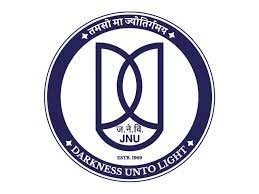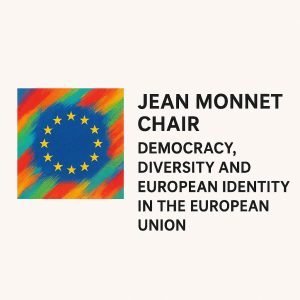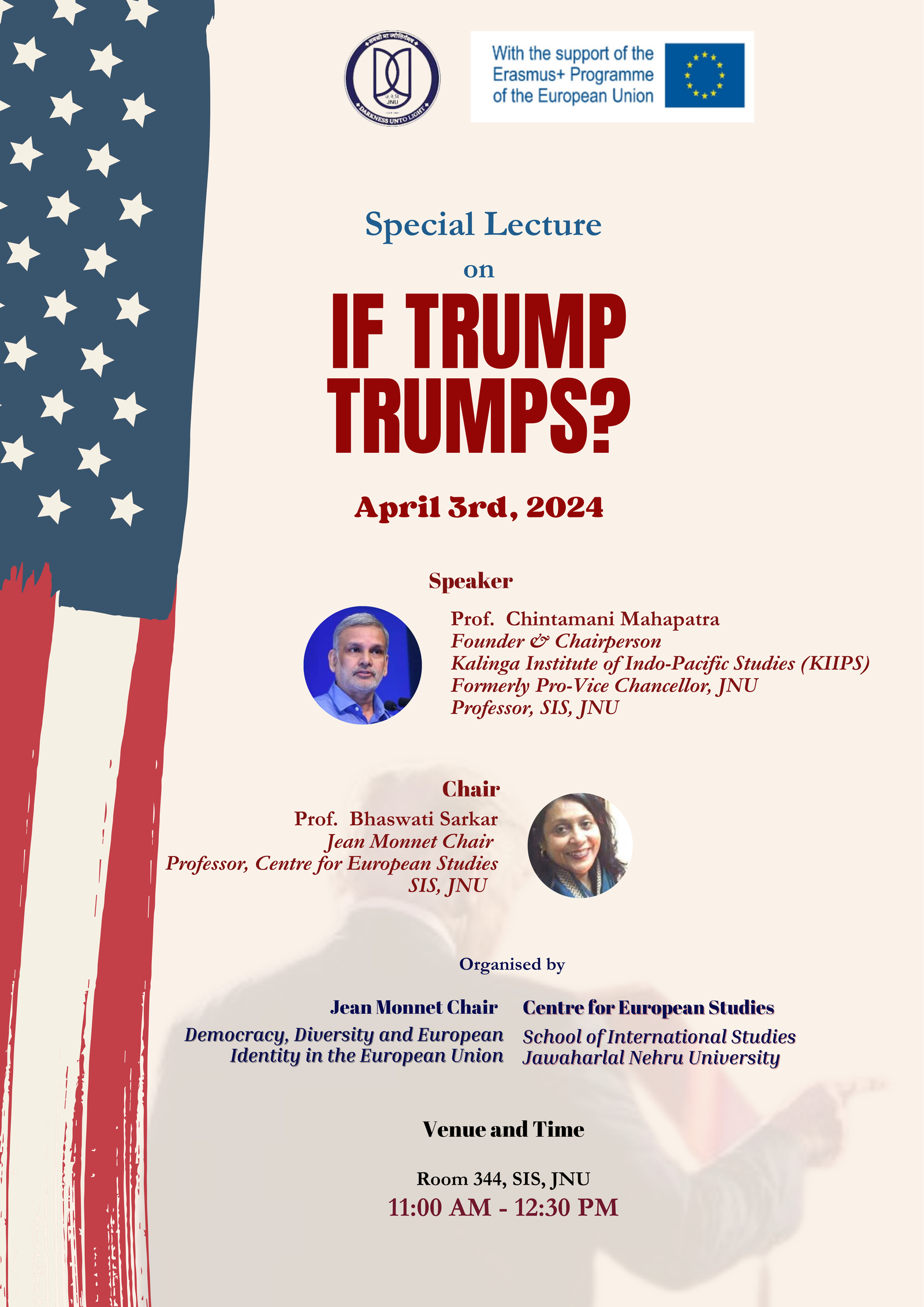
- This event has passed.
Special Lecture – “If Trump Trumps?”




Special Lecture
on
If Trump Trumps?
April 3rd, 2024
Speaker
Prof. Chintamani Mahapatra
Founder & Chairperson
Kalinga Institute of Indo-Pacific Studies (KIIPS)
Formerly Pro-Vice Chancellor, JNU
Professor, SIS, JNU
Chair
Prof. Bhaswati Sarkar
Jean Monnet Chair
Professor, Centre for European Studies
SIS, JNU
Organised by
Jean Monnet Chair
Democracy, Diversity and European Identity
In the European Union
Centre for European Studies
School of International Studies
Jawaharlal Nehru University
Venue and Tine
Room 344, SIS, JNU
11.00 AM – 12.30 PM
Event Report
A Special Lecture on the topic “If Trump Trumps?” was held on April 3rd, 2024 where Prof. Chintamani Mahapatra was invited as the expert and speaker of the event. The talk highlighted how the upcoming election in the United States of America (U.S.A.) will impact domestic and international politics.
Prof. Chintamani started his lecture by highlighting that despite Trump’s election loss in 2020, “Trumpism” has remained a formidable force in American politics, indicating that his political ideology resonates with a substantial portion of the U.S. electorate. Prof. Mahapatra highlighted how Trump’s brand of governance emphasises an “elitist” approach, favouring select interests and operating with a dismissive attitude towards the opposition. Trump’s influence over the Republican Party has only grown as he maintains a strong grip on its members and aligns with those who support his ideology.
Prof Chintamani further remarked that Hhs coming to power will bring in strong policies on immigration, more nationalistic policies, divisive and conservative politics, and no citizenship for immigrants. He also talked about how his first order of business will tackle deep state FBI and perks for lower-level Trump loyalists with an introduction and focus on the spoils system. Under his leadership, there will be an impact on US-China relations, and American interests will be primary. He is likely to try maintaining the American hegemony, reclaiming lost islands.
This form of leadership under Trump prioritises loyalty and exhibits a combative style that is different from traditional political decorum. It has been observed that Trump’s emphasis on “hooliganism” rather than “rational dialogue” marks a shift from conventional conservative politics, with potential implications for governance style if he returns to office.
On Domestic Policy Directions: Immigration, Nationalism, and Governance the second Trump administration would likely prioritize policies that reflect his conservative, nationalistic stance. And Trump would likely resume his hardline stance on immigration, intensifying border controls and potentially pursuing legislative changes to limit pathways to citizenship. This approach would solidify the U.S.’s restrictive policies towards immigrants, aiming to tighten national borders and heighten American self-reliance.
Prof. Mahapatra noted that Trump’s governance philosophy aligns with the “spoils system,” in which loyalty is rewarded with governmental positions. Trump is expected to reconfigure the U.S. government to favour his supporters at every level, promising to dismantle what he perceives as the “deep state,” particularly in agencies like the FBI. This approach, which would prioritize political loyalty over professional qualifications, could lead to major shifts in the structure and functioning of federal agencies.
He also highlighted that Trump’s potential re-election would strain U.S.-European relations, which have already been under tension due to his unilateral and nationalistic approach. A second Trump administration would likely pull back from multilateral engagements and treaties that don’t serve immediate American interests. Transatlantic relations, particularly with NATO, could experience renewed friction, as Trump has historically demanded increased financial contributions from allies and criticized their reliance on American defence support. This pivot towards a more insular approach could weaken Western alliances and create a vacuum that may embolden rival powers.
And the ongoing conflict in Gaza is another area that Trump’s re-election could significantly impact. Prof. Mahapatra emphasized Trump’s established record of strong support for Israel, which could shape his response to the Gaza war. His potential return to office might see a continuation of the policies that lean heavily in favour of Israeli interests. Trump’s previous recognition of Jerusalem as Israel’s capital and his decision to move the U.S. Embassy there reflect a pro-Israel stance that aligns with his political base and ideological outlook.
On U.S.-China Relations
Prof. Mahapatra highlighted the likelihood that Trump’s return would see an even firmer stance on China, a priority in Trump’s agenda to maintain American hegemony on the global stage. Trump’s policies could aim to counter Chinese influence aggressively, with a specific focus on economic competition and strategic control over disputed territories. There is also an observation that Trump’s re-election might lead to policies designed to “reclaim lost islands” or establish a more assertive American presence in the Indo-Pacific region, directly countering Chinese expansionist aims.
The U.S.-China trade war, which Trump initiated during his first term, could re-emerge with renewed vigour, potentially leading to higher tariffs and more stringent sanctions on Chinese firms. This stance would underscore Trump’s America-first agenda, aiming to prioritise American economic interests and diminish reliance on Chinese imports. The potential for escalating tensions could lead to a further division between the world’s two largest economies, impacting global supply chains and pushing other countries to take sides.
Prof. Chintamani Mahapatra’s lecture highlighted significant implications that a second Trump administration would likely have on both the domestic and international stages. His emphasis on Trump’s unorthodox approach to governance, characterised by elitism, a rewards-based loyalty system, and a combative stance towards dissent, presents a scenario where the U.S. shifts further from multilateralism and global cooperation. Domestically, Trump’s policies could intensify nationalism, restrict immigration, and erode traditional governance structures, prioritising loyalty over expertise. Internationally, his impact on U.S.-China relations, the Gaza conflict, and transatlantic ties would likely mark a continuation of his “America-first” philosophy, reinforcing U.S. interests even at the expense of diplomatic relations and established alliances. Prof. Mahapatra pointed out that Trump’s potential re-election is not merely a return to familiar policies but a continuation of “Trumpism,” a disruptive force that would redefine the role of the U.S. on the world stage and within its borders.
